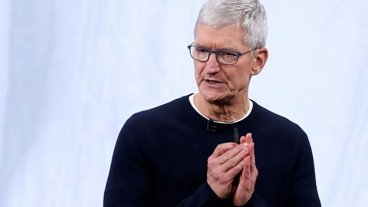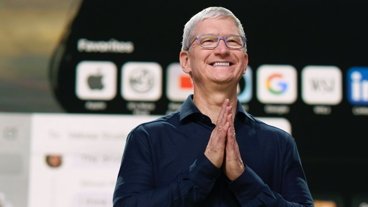iPhone interest said to be larger than market anticipates
A survey conducted last month by investment bank Morgan Stanley found that interest in Apple's upcoming iPhone is much larger than the market currently anticipates, driving the firm to raise its estimates for the Cupertino-based iPod maker through 2007.
"In keeping with our iPod 'halo effect' thesis, Apple’s brand reputation is the largest driver of this interest, and the survey results suggest iPhone demand could increase even more if Apple successfully expands awareness of the product, broadens the iPhone product portfolio, extends to other carriers, or offers service contract or product discounts," analyst Kathryn Huberty wrote in a note to clients.
Huberty said that with the high-end device market clearly growing, iPhone is well positioned to disrupt potential market shares, placing service providers with limited lock-in and a younger customer base at the most risk of share losses to Cingular.
According to the survey results, demand for the new Apple communications device will stem from two primary sources: consumers who own or plan to buy a high-end device (HED) and those that are already amongst Apple’s existing customer base.
"Our survey shows that those who already own/plan to buy a HED are 12 times as likely to purchase an iPhone as people who neither own/plan to buy a HED nor own any Apple product," Huberty wrote. "Respondents that don’t own a HED but do own an Apple product are 13 times as likely to purchase the iPhone as people who neither own/plan to buy a HED nor own any Apple product."
Supplementing the survey findings with some assumptions, the analyst said she now expects Apple to sell roughly 8 million iPhones over the next twelve months, up from her previous forecast of 6 million. At the same time, however, she lowered her 2007 calendar year iPod unit estimates to account for a 48 percent iPod cannibalization rate implied by the iPhone survey, which is slightly higher than the 33 percent she had forecast.
Examining potential for additional iPhone upside, Huberty noted a direct correlation between consumers’ iPhone awareness and the level of 'extreme interest' in purchasing an iPhone evidenced by her firm's survey results.
"Only 18 percent of the 2,500 total respondents had 'heard a lot about the iPhone and its features' at the time of our survey, followed by 36 percent who had 'heard of iPhone but did not know much about it', and 45 percent who had 'never heard of an iPhone,' she explained. "The level of extreme interest in iPhone was 20 percent, 5 percent, and 3 percent, respectively, for these subgroups."
Huberty added that Apple's recent settlement with Cisco affords it the opportunity to aggressively market iPhone and increase awareness, which she expects will help drive interest levels higher.
Meanwhile, the analyst believes there is a 'high likelihood' Apple will expand its iPhone portfolio over the next twelve months to help address some of the existing barriers to adoption, such as the high cost of the device and inflexible wireless carrier contract pricing.
"We believe Apple will introduce new, lower-priced iPhones in late 2007 or 2008, making the product more attractive to a wider range of users," she wrote, noting her view that the $200-$300 range would represent the "sweet spot" for mass adoption. "We also believe Cingular and Apple have discussed creative contract pricing which would also put an upward bias on our current model."
A meaningful discount to service contract pricing on the part of Cingular could increase her firm's iPhone forecast by 70 percent," she added.
Following its iPhone survey, Morgan Stanley is forecasting Apple to earn $3.62 per share during the 2007 calendar year, up $0.43 from its previous estimates of $3.18. The firm also bumped revenue and gross margin estimates by $561,000 and 1.9 percent, respectively, to $25.71 million and 30.8 percent. iPod unit forecasts were reduced by the aforementioned 1.5 million figure to roughly 45 million units, while the firm made no change to its 2007 Mac unit estimates of 6.297 million.
"We’d be buyers of Apple on incremental revenue and operating leverage," Huberty told clients. "We believe the market is underestimating the likely success of iPhone."
 Prince McLean
Prince McLean










 Malcolm Owen
Malcolm Owen
 William Gallagher and Mike Wuerthele
William Gallagher and Mike Wuerthele
 Christine McKee
Christine McKee
 William Gallagher
William Gallagher

 Marko Zivkovic
Marko Zivkovic









